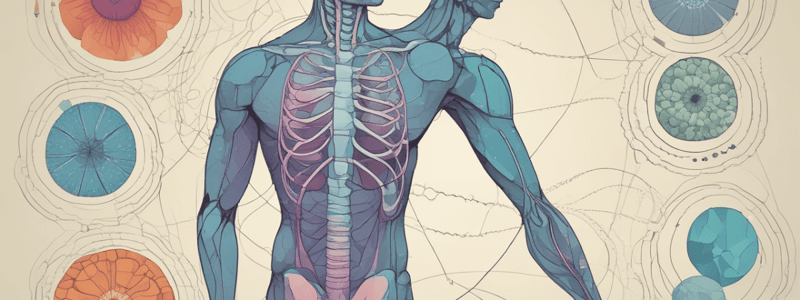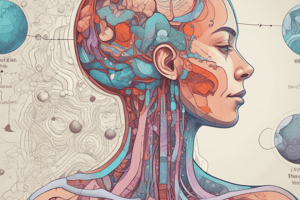Podcast
Questions and Answers
How do plants obtain the minerals they need?
How do plants obtain the minerals they need?
Plants obtain the minerals they need from soil or fertilizer.
What is the primary way animals obtain minerals?
What is the primary way animals obtain minerals?
Animals obtain minerals when they consume plants and other animals or substances that contain these elements.
What is the significance of the fact that minerals are indestructible?
What is the significance of the fact that minerals are indestructible?
Heating a food or exposing it to most other environmental conditions will not affect the food's mineral content.
What is one way to obtain minerals from food that would otherwise be discarded?
What is one way to obtain minerals from food that would otherwise be discarded?
What is one example of a mineral that forms an inorganic structural component of tissues?
What is one example of a mineral that forms an inorganic structural component of tissues?
What is an example of a mineral ion that participates in blood clotting?
What is an example of a mineral ion that participates in blood clotting?
How many mineral elements have known functions in the body?
How many mineral elements have known functions in the body?
What can happen if the body is exposed to excessive amounts of minerals?
What can happen if the body is exposed to excessive amounts of minerals?
Why do people need to be cautious when taking dietary supplements containing individual minerals?
Why do people need to be cautious when taking dietary supplements containing individual minerals?
What is the effect of a large amount of zinc in the intestinal tract on copper absorption?
What is the effect of a large amount of zinc in the intestinal tract on copper absorption?
When are single-mineral supplements generally necessary?
When are single-mineral supplements generally necessary?
Why is a daily multiple vitamin and mineral supplement generally considered safe for healthy people?
Why is a daily multiple vitamin and mineral supplement generally considered safe for healthy people?
What is a potential risk of taking dietary supplements containing individual minerals?
What is a potential risk of taking dietary supplements containing individual minerals?
What is the role of a cofactor in the human body?
What is the role of a cofactor in the human body?
What are the consequences of excessive mineral accumulation in the body?
What are the consequences of excessive mineral accumulation in the body?
Why is bioavailability of minerals important, especially during periods of growth?
Why is bioavailability of minerals important, especially during periods of growth?
What is the difference in mineral content between plant and animal foods?
What is the difference in mineral content between plant and animal foods?
Why is it important to include whole-grain products in your diet?
Why is it important to include whole-grain products in your diet?
What is the significance of fluoride in public water supplies?
What is the significance of fluoride in public water supplies?
What are the benefits of consuming 'hard' water?
What are the benefits of consuming 'hard' water?
Why do people often drink bottled water instead of tap water?
Why do people often drink bottled water instead of tap water?
What is the importance of following MyPlate recommendations for mineral intake?
What is the importance of following MyPlate recommendations for mineral intake?
Why is it crucial to maintain an adequate supply of minerals in the body?
Why is it crucial to maintain an adequate supply of minerals in the body?
Flashcards are hidden until you start studying
Study Notes
Minerals: Basic Concepts
- Minerals are inorganic elements found in Earth's rocks, soils, and natural water sources.
- Plants obtain minerals from soil or fertilizer, while animals get them by consuming plants and other animals.
- About 15 mineral elements have known functions in the human body and are necessary for health.
Functions of Minerals
- Minerals form inorganic structural components of tissues, such as calcium and phosphorus in bones and teeth.
- Minerals function as inorganic ions, participating in blood clotting, fluid balance, and acid-base balance.
- Some ions, like magnesium and copper, are cofactors, activating chemical reactions.
- Minerals are components of enzymes, hormones, and other organic molecules, like cobalt in vitamin B-12 and iron in hemoglobin.
Absorption and Retention of Minerals
- The body absorbs more minerals than it needs, with the excess excreted in urine or feces.
- The body stores extra minerals in the liver, bones, or other tissues.
- Toxicity signs and symptoms occur when minerals accumulate and interfere with cellular function.
Sources of Minerals
- Food groups from MyPlate that are rich sources of minerals include:
- Dairy products (calcium, phosphorus)
- Meat, poultry, fish, and beans (iron, zinc)
- Fruits (potassium, copper)
- Vegetables (magnesium, manganese)
- Grains (selenium, copper)
- Animal foods tend to be more reliable sources of minerals, such as iron and calcium, due to higher concentrations.
- Plant foods can contain substances that reduce mineral bioavailability, like phytates and oxalates.
Factors Affecting Mineral Bioavailability
- The body's need for the mineral increases bioavailability, especially during growth periods like infancy and puberty.
- Processing and refinement of plant foods can lower their natural mineral content.
- Tap water can be a source of minerals, including fluoride, calcium, magnesium, and iron.
Dietary Supplements and Minerals
- A daily multiple vitamin and mineral supplement is generally safe for healthy people.
- Dietary supplements containing individual minerals, like iron or selenium, can be toxic if taken in excess.
- Excess of one mineral can interfere with the absorption or metabolism of other minerals.
Studying That Suits You
Use AI to generate personalized quizzes and flashcards to suit your learning preferences.




